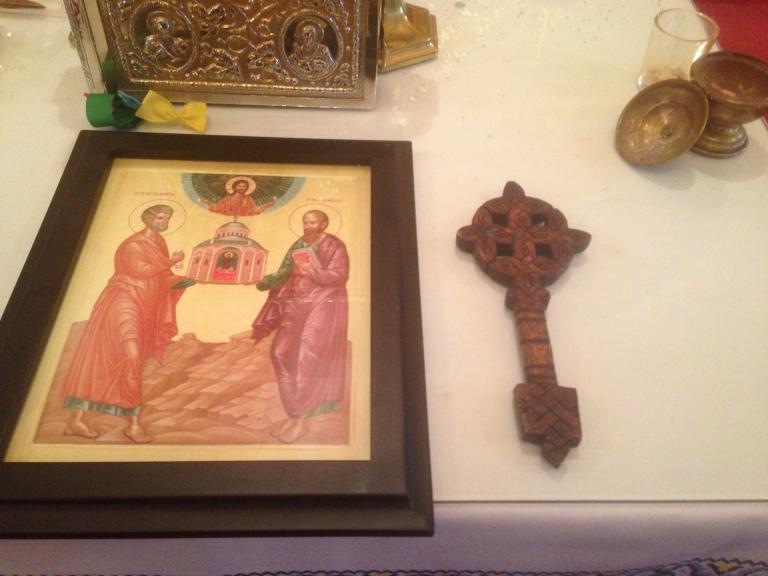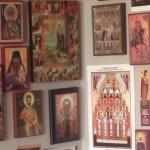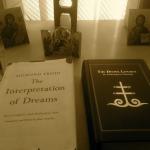
I will always remember the moment I was received into the Kyivan Church. After I made a profession of faith at the narthex of the temple, my spiritual father led me on his epitrakhil (the thing the priest wears around the neck) into the sanctuary. This moment was the formal churching part of the Rite of Reception: I was being received by my spiritual father into the congregation of the church assembled, and even more meaningfully, my biological father – an Anglican missionary priest ordained in the Province of Rwanda – read Psalm 66 in Cantonese as I entered the temple, invoking in the language of my heart the face of G-d to shine upon us. When I got to the tetrapod up front, I made a prostration, and then stood on bended knees. In so doing, I brought myself to eye level with the icon of Ss Peter and Paul.
Today, two of my friends – mirroring me, former Cantonese Protestants brought in by our shared solidarity with Hong Kong’s Umbrella Movement – will have the same experience. Like me, they will push out their hands in a western direction to renounce heresies and heretical associations. As I did, they will turn eastward toward the rising Sun of Righteousness and profess their faith. Together, they will be led into the sanctuary on the epitrakhil of our spiritual father. As their reception occurs on the anniversary of mine on the Feast of Ss Peter and Paul, they too will make a prostration at the tetrapod and be brought to eye-level not only with the book of the Gospels on which they will be absolved from their sins, but also with the faces of the chiefs among the apostles, holding aloft the Church in their hands.
My evangelical Protestant friends, whom I invited en masse to my chrismation service, told me that as I knelt before the tetrapod, they had never seen me look more at peace than in that moment. One of them said that it felt like I had found my home. Another confessed to me afterward that he had burst into tears when he saw me coming in on my spiritual father’s epitrakhil. When I asked him why, he told me that he knew that I had broken free of my Protestant past. My baggage with Protestantism is complicated, some of it good, some of it bad, much of it neither here nor there. He saw the thread that had constrained my agency by always having me in my biological father’s ministry shadow and required that I toe an apolitical line in order to become an agnostic apologist for established structures of power. I replied that all that may have been true, but the truth is that I had fasted that entire day, having ingested nothing but water, and so I was probably just hungry.
But if I am honest, I remember that moment all too vividly. I realized as I came to my knees that I was being brought face-to-face with the icon of the Holy Apostles Peter and Paul, the church between them in their hands. I remember seeing the Most Holy Theotokos in that temple and realizing that I too was being brought into this house. I heard the voice of the Polish Dominican concelebrant I had invited from Seattle channeling his inner Karol Wojtyła as he pronounced the biblical verses of reception over me, beginning with, Send forth Your Spirit, and they shall be created; and You shall renew the face of the earth. I recall thinking at the time that I had indeed found a home, how lovely is this dwelling-place of God Almighty, and better is one day in these courts than a thousand elsewhere.
As I reflect two years out from this moment, I realize that this part of the reception was the beginning of an intellectual journey on which I did not expect to embark. Last night, on the eve of Ss Peter and Paul, my spiritual father and I, along with an evangelical friend of ours, prayed the Akathist to Ss Peter and Paul. Each year since my chrismation, I have tried to pray this on the Feast of Ss Peter and Paul, and it has begun to grow on me.
In many ways, the Akathist to Ss Peter and Paul is a corrective to my Protestant upbringing. In Protestantism, I saw the Holy Apostles Peter and Paul as historical figures, their writings as texts to be exegeted and applied. But the Akathist emphasizes how personal my relationship is to them:
Rejoice, first after Christ among the Apostles, foundation of the Holy Church.
Rejoice, powerful pillar of the Orthodox Faith and its confirmation.
Rejoice, zealous lover of Christ’s teaching.
Rejoice, first seated of the Apostolic College.Rejoice, good gatekeeper of the Kingdom of Heaven.
Rejoice, renowned physician of those who repent of their sins.
Rejoice, rejecter of worldly vanity and lover of the spiritual life.
Rejoice, abandoner of material nets and fisher of the universe with imperishable nets.Rejoice, enlighteners Peter and Paul, who enlighten like two great luminaries.
Rejoice, twins yoked together by God, His chariots bearing the light of knowledge.
Rejoice, all you Holy Apostles, seers of God, for you are lights of the world.
Rejoice, for through you, through Christ, everywhere the Faith that saves us shines forth.Rejoice, Holy Chief Apostles Peter and Paul,
together with all the Holy Apostles.
It is not just the writings and actions of Ss Peter and Paul that are important here. Later on, there are other phrases: they are ‘like two cherubim, covering the Ark of the Holy Church,’ ‘like two eyes of the Church that see divine things,’ ‘like two wings of the Church, from Christ, the Great Eagle,’ ‘like two sources of nourishment of the Church of our Mother, the Bride of Christ,’ ‘two pillars of the Church as asserted by the heavenly Solomon,’ ‘two olive trees which bear mercy,’ ‘two tablets of the commandments of the Lord,’ ‘two trumpets of silver of Moses,’ ‘like the two mountains Tabor and Hermon, mounts of reason,’ ‘two streams of living water from the source of the Holy Spirit flowing forth,’ and so on and so forth. The knowledge of the Holy Apostles is a matter of intimacy. My relationship to Peter and Paul is personal. The wisdom I receive from them is communion between persons.
Perhaps the greatest intellectual change that has occurred with me since my reception is this emphasized link between knowledge and the person. Growing up Protestant, I was always taught that there was a difference between knowledge and wisdom, that knowledge is the information you might know and that wisdom was the ability to apply what you know to a situation. There was also a distinction between love and knowledge; in Paul’s famous words to the Corinthians, knowledge puffs up, but love builds up. There was an assumption that if you know things, you might not be loving, and if you love, you just might have to resign yourself to stupidity. For me then to pursue the life of an intellectual and to struggle through the perilous labyrinth of academia was to embark on the path of alienation. Whenever I tried to speak of my academic pursuits in my everyday life, I was told that nobody cared, that I had to bring myself down to the level of ordinary people.
In reflecting on my reception into the Kyivan Church, I am discovering that I have renounced this distinction. Put in context, the Holy Apostle Paul’s seeming distinction between gnosis and agape is the difference between able to rationalize through legal loopholes why Christians can eat food sacrificed to idols and the theological truth that our togetherness as church, our koinonia, means that true knowledge is that which arises from the assembled people of God. In being brought among the people of God before the icon of the chief apostles, I have been converted to this kind of intellectual life. The intellect is neither high nor low; it is an integral part of the person that is renewed, as we say in our tradition, by being brought into the heart to meet our Lord Jesus through the prayer by which our hearts beat together: Lord Jesus Christ, Son of God, have mercy on me, a sinner.
Spiritual life since my reception into the Kyivan Church has been a constant struggle for the renewal of my intellect. I told my spiritual father the other day that it is like the writing, reading, thinking, and even grunt-work organizational parts of my life are held together by the practice of prayer. The more regular I am at it (I am a little better this year than last year, and just a little better than the year before that), the more it is becoming like eating and exercise. If I want to do my intellectual work, I have to pray regularly, and when I pray, am I not simply opening myself to the love that is G-d?
This insight is for me, then, the reason for my devotion to apostolic teaching. It is not a matter of ideological compliance, and it is not conform myself to an impersonal orthodoxy. It is because as I was brought in before the assembled people of God, the chief apostles stood before me in their icon, welcoming me into the church out of whose love true knowledge is born. The deacon intones, Wisdom, before the apostolic reading in our liturgy. Let my heart, quieted like a weaned child and at peace because I am home, be attentive.












